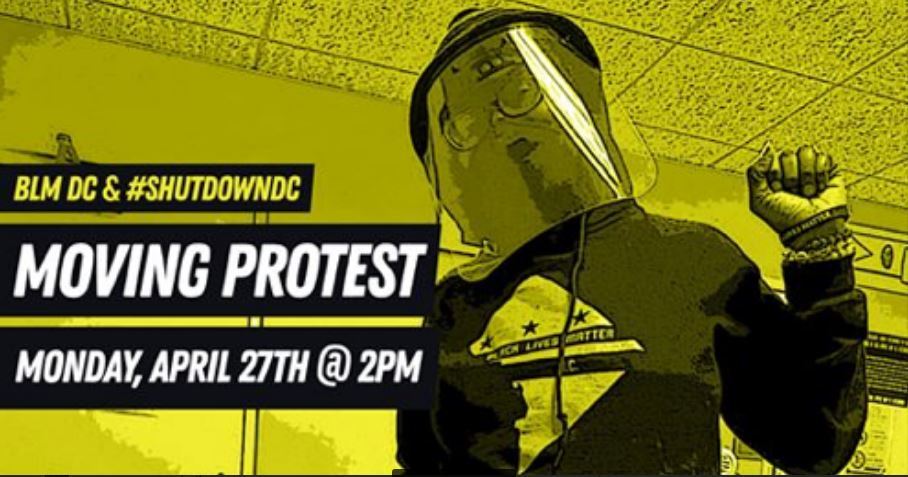[ad_1]
By Micha Green
AFRO D.C. Editor
mgreen@afro.com
As the saying goes, “When White America catches a cold, Black America gets the flu,” and much of the reasoning behind that fact-based adage is due to issues of institutionalized, systemic and environmental racism. With the 50th anniversary of Earth Day last week and the current COVID-19 pandemic, global warming and the novel coronavirus are both worldwide crises, however in D.C. these major issues hit home hard. On April 27, Black Lives Matter DC, #ShutDownDC and Long Live GoGo collaborated for the “Essential, Not Expendable Moving Protest,” to speak on the disproportionate injustices in the Black community that are felt even more as a result of the climate change crisis and global pandemic.
“We knew collectively that this was a critical moment and we chose to take action together,” April Goggans, a core organizer with Black Lives Matter DC told the {AFRO}. “Climate change, incarceration (including institutionalization and detention), and the COVID-19 pandemic are immediate crises for everyone, but for Black people, and specifically Black people in D.C., the impact of these crises is far more devastating. These disparities have historical roots. They are not random or unintended; they are intentional and systematic. They highlight the disposability of Black people upheld by White supremacy, imperialism, patriarchy, militarism and capitalism.”

The protest was not only held to raise awareness about issues affecting D.C.’s Black community as a result of the pandemic, but also to celebrate Black essential workers for their contributions and express support for one another during these unprecedented times.
“The purpose of the protest was to celebrate essential workers, to confront the politicians and corporate executives who continue to put Black and Brown communities at risk,” Goggans said. “The protest was an outward expression of deep internal love for each other and ourselves.”
While the District and Council has responded with COVID-19 legislation and amendments, Goggans said the protest was to apply pressure to local leaders on how the virus is being treated.
“We are calling for everyone, including the media, to interrogate the statements made by District officials including Mayor [Muriel] Bowser, Deputy Mayor Kevin Donahue, and Police Chief [Peter] Newsham regarding how D.C. is addressing COVID,” Goggans said.
As of April 28, 3,994 people tested positive for the novel coronavirus in D.C., and 50 percent of those patients are Black. In addition, 190 people have died in the District as a result of complications from COVID-19 and 150 of the lives lost are Black- that’s 79 percent.
Black Lives Matter DC noted that African-American essential workers and the incarcerated are some of those truly suffering and dying due to the pandemic.
“In D.C., the data clearly shows that Black essential workers and Black people in cages bear the brunt of the District’s transmission and death. This is also the reality for Black communities all over the country,” Goggans said.
In a statement sent by ShutDown DC, protestors took part in the event by participating in three simultaneously moving protests. Starting at 2 p.m., with vehicle and bicycle caravans, protestors visited grocery stores, hospitals and government offices, before concluding at 2845 Alabama Avenue S.E. in the parking lot of the Safeway for a live GoGo performance that brought members from different bands together for one show.
“We got involved with the protest because we support the efforts of Black Lives Matter, and also any effort that positively affects the Black community-which essentially is the culture of D.C.,” said Justin “Yaddiya” Johnson, founder of Long Live and GoGo and organizer of Moechella.
“The music is important because we always use that as a source of communication and a rallying point, so it just shows a true display of the culture and us standing in solidarity around that, because even though we’re taking a stance on the incarcerated and essential workers, these are people of the culture,” Johnson told the AFRO. “It all ties in our efforts- which is always to preserve the culture and move it forward.”
As the event was not only a protest, but also a celebration, Goggans said incorporating GoGo was the perfect way to show appreciation for local Black essential workers.
“GoGo is the official music of D.C. and more significantly it is revolutionary, liberation music. It is music that was criminalized and is continuously erased (made expendable) through anti-Blackness attacked by the monster that is gentrification. It is the sound of the streets and the heartbeat of the people. To truly celebrate the mostly Black essential workers, those that are incarcerated and institutionalized, GoGo is so necessary.”
[ad_2]
Source link
